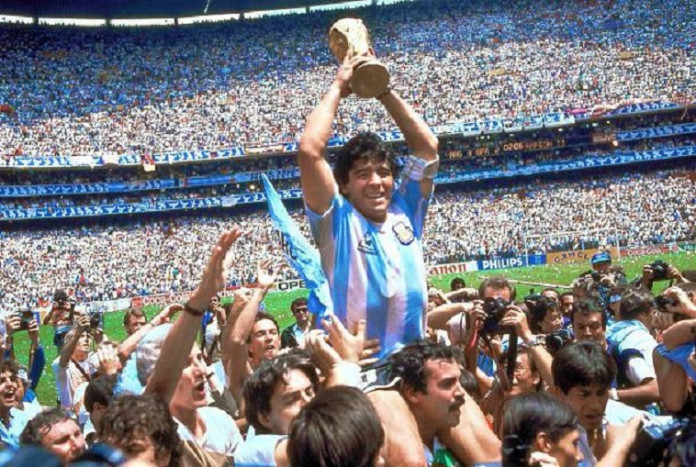The previous article was a voyage through three World Cup tournaments, 1974, 1978 and 1982. A new trophy was designed for the 1974 tournament as Brazil earned the right to keep the Jules Rimet in perpetuity with their triumph in 1970.
West Germany emerged victorious on home soil in 1974, beating a formidable Dutch side inspired by ‘Total Football’. The Dutch were undone for the second time in 1978 against hosts Argentina during a final decorated by confetti and ticker tape. In 1982, 40 year-old goalkeeper Dino Zoff led an Italian side which was spearheaded by Paolo Rossi for their third title beating West Germany in Madrid.
Maradona’s forces reach the summit in high altitude Mexico – 1986
It was dubbed ‘Maradona’s World Cup’ simply because it became a tournament marked by the mastery of Diego Maradona.
After Colombia resigning as hosts in 1982 due to economic reasons, the hosting rights were given to Mexico, thereby making them the first country to hold football’s greatest show for a second time. The previous occasion was adorned by the star studded Brazilian outfit in 1970 while this time it was Argentina who overcame the difficult conditions of heat and high altitude to emerge victorious. Maradona dominated the tournament in a way that only Pele has done before as the acclaimed no.10 scored five goals and created another five of Argentina’s 14 goals throughout the course.
The tournament was staged in 12 venues spanned across nine host cities while Estadio Azteca was preparing itself to be the first stadium in the world to host the grand finale two times. The tournament also witnessed the phenomenon dubbed ‘Mexican wave’ for the first time, which was later popularized world-wide.
During the opening round, defending champions Italy were held 1-1 by Bulgaria. In the same group, Argentina beat South Korea 3-1 and later drew Italy 1-1. The surprise package Denmark, who appeared for the first time in the World Cup, stormed through ‘the group of death’, beating Scotland 1-0, Uruguay 6-1 and favourites West Germany 2-0. The match between Scotland and Uruguay saw a red card on Jose Batista. Less than one minute into the game, Batista was sent off after a foul on Gordon Strachan earning him the fastest red card in a World Cup game. Morocco topped their group and qualified for the knockouts, becoming the first team outside Europe or South America to do so after North Korea’s achievement in 1966. Portugal, making their first appearance in 20 years, went on strike during the competition as a result of the ‘Saltillo Affair’. Players refused to train between their games while eventually they were eliminated from the group stage with their lost to Morocco.
During the knockouts, France ended the run of reigning champions Italy with a 2-0 win. Goals by Michel Platini and Yannick Stopyra sealed the win for the French. Argentina edged pass rivals Uruguay with a 1-0 win. Denmark was finally eliminated in a 5-1 drubbing by Spain, where Butragueno scored four goals. West Germany inched a spirited Moroccan side with an 87th minute goal by Lothar Matthaus. The game between Bulgaria and hosts Mexico was remembered for the outstanding scissor-kick goal by Manuel Negrete which is honoured by a remembrance plaque at Estadio Azteca.
All four quarterfinal matches carried excitement as three saw penalty shootouts. The fixture between France and Brazil went into a penalty shootout with scores level at 1-1 after Zico missed a penalty which could’ve ensured a win for the Brazilians at full time. France won 4-3 on penalties. In the other two games which were decided by penalties, saw West Germany and Belgium beat Mexico and Spain respectively.
The game between Argentina and England was remembered for two different goals by Maradona. The first was an illegal goal scored using his hand, where after the game he claimed that the goal was scored using both his head and hand which became to be known as ‘Hand of God’ goal. Four minutes later he scored his second goal. Regarded as the ‘Goal of the Century’ it saw the maestro cover 60m, dribbling pass five English players including the goalkeeper Peter Shilton before scoring the goal. Gary Lineker the top scorer of the tournament later stated on BBC, “That second goal was the one time in my life where I felt like I ought to applaud the opposition. I didn’t, because I was gutted, but it was undoubtedly the greatest goal I had ever seen.”
West Germany beat France 2-0 in the semi final while Argentina overwhelmed Belgium 2-0 where again, both were scored by Maradona.
The final at Estadio Azteca on 29th June, saw a five-goal thriller. After Jose Brown and Jorge Valdano put the ‘albiceleste’ in front, the Germans forced a comeback in the 74th and 80th minutes with captain Rummenigge and Rudi Voller scoring respectively. However the 2-2 scoreline lasted for only 3 more minutes as Jorge Burruchaga scored following an excellent assist by Maradona which finally proved to be the winner. The crowd of nearly 115,000 witnessed Maradona and his forces earning a second world title as West Germany had to settle for silver for the second successive tournament. Karl-Heinz Rummenigge became the first and the only player to captain a losing side in two finals. Gary Lineker of England won the Golden Boot for his six goals while Diego Maradona won the Golden Ball award for the best player.
West Germany – “third time lucky” – 1990
After appearing in the finals since 1982, West Germany finally clinched their third World Cup title as they avenged Argentina for the defeat four years earlier. The 1990 edition stands as the lowest-scoring tournament with a goal average of 2.21 per game and also saw the handing out a record 16 red cards throughout the tournament. The reason behind the low goal average was the negative tactics shown by teams on “playing it safe” until 120 minutes and try their luck on penalties rather than risk going forward. A record of four penalty shootouts (which was later equaled in 2006) were played out while eight matches ran extra-time
Italy hosted the tournament after 1934, becoming the second country to arrange the tournament twice after Mexico. Twelve venues in twelve different cities hosted games. Stadio San Nicola in Bari and Stadio delle Alpi were newly built to stage the big event.
Despite ending the match with nine men, Cameroon shocked world football with a 1-0 win over defending champions Argentina in the opening game of Italia 90. Hosts Italy began with a 1-0 win over Austria thanks to a strike by Salvatore Schillaci who appeared as a substitute. Roger Milla of Cameroon, along with two goals against Romania, became the oldest goal scorer in World Cup history (Later in 1994, he bettered his own record). West Germany topped a relatively high-scoring group.
During knockouts, the title holders Argentina beat rivals Brazil 1-0 while West Germany overcame Netherlands in a rematch of the 1974 final. The clash at San Siro featured 6 Milanese players, three from each team. Germans Brehme, Matthaus and Klinsmann were playing for Inter at the time while Dutch players Marco van Basten, Ruud Gulllit and Frank Rijkaart were at AC Milan. Meanwhile Cameroon defeat Colombia with two extra-time goals to reach the quarterfinals, becoming the first African nation to do so but eventually were beaten by England.
The final four in the tournament saw four previous winners, Italy, Argentina, West Germany and England. After the 1970 tournament, this is only the second time in the history of the World Cup this has occurred. Both semi finals were decided by penalties where West Germany beat England 4-3 in the shootout after scores were leveled at 1-1 after extra-time. Argentina at the other end, overcame their second consecutive penalty shootout beating hosts Italy by the same scoreline. The two wins, against Yugoslavia in the quarterfinals and against Italy in semi finals were much to the heroics of goalkeeper Sergio Goycochea who came during the mid way of the campaign to replace Nery Pumpido.
The final between West Germany and Argentina was played in Stadio Olimpico in Rome. A rematch from the previous final, it was cited as the lowest quality of all World Cup finals. It was an ill-tempered game. Pedro Monzon was sent off in the 65th minute after a tackle on Klinsmann making him the first player to be sent off in a World Cup final. The scores were deadlock until the 84th minute when the referee awarded a much disputed penalty to Germany following a foul on Rudi Voller by Roberto Sensini. Later during the game, a second red card was awarded to Argentina as Gustavo Dezotti was sent off. However the penalty by Andreas Brehme found the back of the net despite Goycochea the penalty saving hero dived into the right direction. With the 1-0 win, West Germany finally earned their third world crown after suffering defeats in 1982 and 1986. Argentina became the first team not to score in a final. Italy’s unlikely hero Salvatore ‘Toto’ Schillaci became the top scorer with six goals and also won the award for the best player. Sixteen years after captaining the side to victory in 1974, coach Franz Beckenbauer became the second person to win the World Cup both as a player and a manager behind Mario Zagallo of Brazil.
Brazil at its zenith after 24 years – 1994
The 15th World Cup was held in United States. FIFA hoped that by staging the world’s most prestigious football tournament there, it would lead to a growth of interest in the sport – one condition FIFA imposed was the creation of a professional football league; Major League Soccer. For the first time, three points were awarded for each win instead of two to encourage teams to overcome negative attacking strategies. Player names were cited on the jerseys for the convenience of commentators to recognize them. The tournament goes down as the best attended in history, with average attendance of nearly 69,000 per game.
Games were hosted in nine venues including the Pontiac Silverdome in Michigan, the first indoor stadium to host a World Cup game. The group stage saw the end of Maradona’s World Cup career as he was suspended from the tournament after failing a drug test. Despite high expectations due to a successful qualifying campaign, Colombia misfired in the tournament. The team was supposedly dogged by influence from betting syndicates and drug cartels. Defender Andrés Escobar was a tragic figure of this tournament, as in the group stage match against the United States, he scored an own goal that eliminated his team. Escobar was shot to death outside a bar in a Medellín suburb only ten days later, apparently in retaliation for the own goal.
Bulgaria surprised the fans with a 2-1 win over Germany. The defending champions were competing as a reunited Germany for the first time after 1938. Against Cameroon, Oleg Salenko of Russia became the first and only person to score 5 goals in a single game. The Russian who netted five did not appear in international football afterwards. He ended the tournament as the top scorer alongside Hristo Stoichkov of Bulgaria with six goals.
The final at Rose Bowl, Pasadena witnessed Italy and Brazil hunting for their fourth World Cup crown. After 120 goalless minutes, the match went into penalties. After four rounds of penalties, Brazil was leading 3-2 while Roberto Baggio was given to score the crucial penalty. With his right leg heavily bandaged to protect his injured hamstring, the little no.10 lifted the ball high into the blue California sky and Brazil were champions again, 24 years after their last success which was also against Italy in 1970.
Brazil’s Romario won the award for the best player while the victory was dedicated to the Formula 1 legend Ayrton Senna who suffered a fatal crash few months earlier.


























